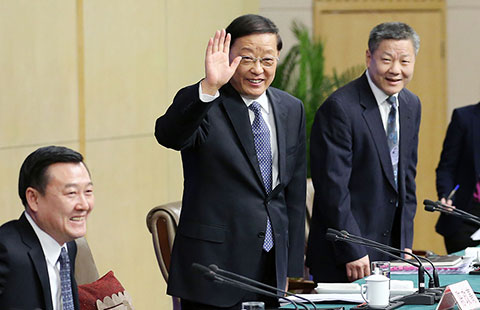Executives survey the prospects for China's future prosperity
(China Daily) Updated: 2016-03-16 09:54
 |
|
Anne Marion-Bouchacourt, Chairwoman of Societe Generale China. [Photo provided to China Daily] |
A1: It shows the leadership's continued commitment to the ever-more challenging economic rebalancing. The relaxation of the growth target sets the tone: The government is not giving up on growth, but it is not just pursuing growth. Instead, achieving a sustainable and healthy growth is the way to go, and the government is willing to give room for some flexibility.
A2: We are embracing the new normal, where China is carrying out structural reform for long-term sustainable growth. Amid the slowing economy is the reform of the corporate sector, and some industries may see an impact as the government is set to tackle the problem of overcapacity. Credit risks and default risks can be an issue. A slowing/moderate growth is expected this year.
On the bright side, the short-term pain will bring a more balanced structure to the Chinese economy in the long run. China is an economic powerhouse in the world, and we have to put things into perspective. Despite the so-called slowdown, the absolute growth in 2015 (which was $450 billion) was bigger than any economy that is not top 30 in size. With its continuous reform and market opening, we believe it will be a key player in the global economy.
A3: We are expecting more cross-border mergers and acquisitions, overseas debt issuance, development and investment projects abroad, both in Europe and along the Silk Roads. As an international bank, we are well positioned to assist Chinese corporates in their overseas developments.
Also, with the developments of the capital markets and the renminbi becoming a reserve currency, there will be a lot of opportunities for long-term investors. We can assist them to get the right return by leveraging our strong expertise in structured products and investment solutions, sectors like green energy or bio-technology.
A4: Definitely-it is a positive move to bolster the economy by giving corporates more room to develop with the easing tax burden. Tax reductions and fee cuts are estimated to be 500 billion yuan ($77 billion), and the corporate sector is set to benefit from the bulk of it.
A multiplier of tax deductions for research and development expenses will be applied, and also preferential tax treatments to startup funds. The move encourages innovation in the corporate sector, which echoes the Made in China 2025 initiative-the first 10-year national plan to transform China from a manufacturing giant into a global manufacturing power with a focus on innovation and quality of production, as we see in sectors like green energy and bio-technology, etc.
- Q&A Transcript: Overcapacity
- Q&A transcription: The five major social insurance programs and housing provident fund
- Q&A Transcript: New economy
- Q&A Transcription: China's economic growth and transition
- New growth engines will help economy to restructure, says Premier Li
- Q&A Transcription: Financial market
- Premier Li assures reform, protection of workers' interests
- Q&A Transcription: Shenzhen-Hong Kong Stock Connect
















